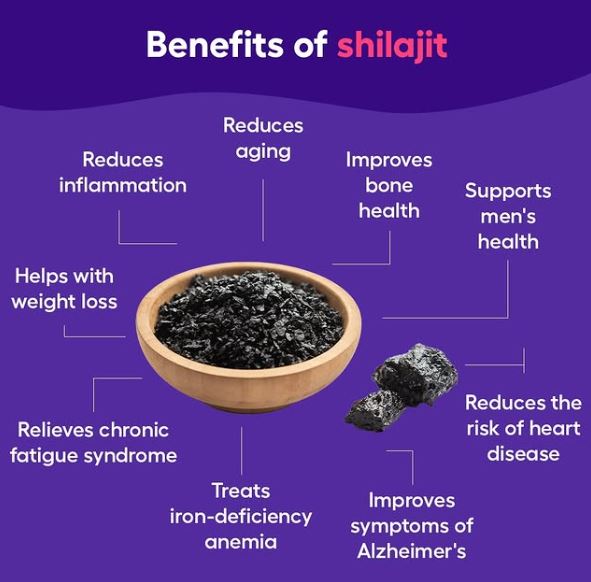Benefits of Shilajit
The Positive Effects of Shilajit

Shilajit is a mineral-rich substance found in mountainous regions, particularly in the Himalayas. It’s a complex mixture of organic and inorganic compounds that has been used in traditional Ayurvedic medicine for centuries.
Origin and Composition
Shilajit forms over centuries through the decomposition of plant matter and minerals. It’s primarily composed of fulvic acid, humic acid, and dibenzo-α-pyrones. These components contribute to its potential health benefits, including several diseases. Shilajit also contains over 84 minerals, including iron, zinc, and magnesium.
The exact composition can vary depending on the source, but fulvic acid is considered the biologically active compound. Andean Shilajit, found in the Andes mountains, shares similar properties to its Himalayan counterpart.
Key Health Benefits of Shilajit
Shilajit offers several potential health benefits, primarily due to its rich mineral content and bioactive compounds, as noted in the current study. Research has shown promising results in various areas of health, with antioxidant and anti-inflammatory properties being two essential aspects.
Antioxidant Properties
Shilajit’s antioxidant properties stem from its high fulvic acid content, which is crucial for its effectiveness against several diseases. A 2012 study found that fulvic acid in shilajit may help prevent the buildup of tau protein, a marker of Alzheimer’s disease.
This compound appears to protect against oxidative stress and cellular damage. Fulvic acid acts as a powerful electron donor, neutralizing harmful free radicals and potentially slowing the aging process at a cellular level.
Anti-Inflammatory Effects
The anti-inflammatory effects of shilajit are attributed to its varied mineral composition and bioactive compounds. Research indicates that shilajit may help reduce inflammation throughout the body, potentially benefiting conditions like arthritis and chronic pain, as discussed in the present study, and may also play a role in managing several diseases.
Its fulvic acid content has been shown to modulate inflammatory responses, while other components like dibenzo-α-pyrones contribute to its overall anti-inflammatory action. These properties may help support overall immune function and reduce systemic inflammation.
Clinical Studies on Cognitive Function
Recent clinical studies have explored shilajit’s potential impact on cognitive function, which may be beneficial for individuals with several diseases. These investigations focus on memory enhancement and Alzheimer’s disease prevention, shedding light on shilajit’s role in supporting brain health.
Memory Enhancement
Clinical research suggests shilajit may enhance memory function, indicating its potential therapeutic benefits beyond physical health. A study involving healthy volunteers showed improved cognitive performance after regular shilajit supplementation.
Participants demonstrated better recall and information processing speeds compared to placebo groups. The fulvic acid in shilajit is believed to be the essential component responsible for these cognitive benefits, potentially by supporting neurotransmitter function and reducing oxidative stress in the brain.
Alzheimer’s Disease Prevention
Emerging clinical evidence indicates shilajit’s potential in Alzheimer’s disease prevention. Studies have shown that shilajit’s high fulvic acid content may help prevent the accumulation of tau protein, a hallmark of Alzheimer’s pathology.
In controlled trials, participants receiving shilajit exhibited reduced markers of oxidative stress and inflammation in the brain, both of which are associated with Alzheimer’s progression. While more extensive clinical trials are needed, these findings suggest shilajit’s promising role in cognitive health maintenance.
Research on Shilajit’s Impact on Fertility
Recent studies have explored shilajit’s potential effects on both male and female reproductive health. The findings suggest promising benefits for fertility, though more research is needed to fully understand its impact.
Male Reproductive Health
Shilajit shows promise in improving male fertility. A 2010 study found that men taking 100 mg of processed shilajit twice daily for 90 days experienced significant increases in total sperm count, healthy sperm percentage, and sperm motility.
These improvements were observed in 28 out of 35 participants. Shilajit’s antioxidant properties may contribute to these positive effects by protecting sperm from oxidative damage and enhancing overall reproductive function.
Female Reproductive Health
While research on shilajit’s impact on female fertility is limited, some studies suggest potential benefits. Shilajit’s high mineral content, including iron and zinc, may support hormonal balance and reproductive health.
Preliminary research indicates that shilajit might help regulate menstrual cycles and alleviate symptoms of polycystic ovary syndrome (PCOS), impacting reproduction in any medium. However, more clinical trials are needed to confirm these effects and determine appropriate dosages for women seeking to improve fertility.
Shilajit’s Role in Athletic Performance
Shilajit has gained attention in the athletic community for its potential to enhance performance and recovery, particularly in relation to testosterone levels in healthy volunteers. Recent studies have explored its effects on endurance, stamina, and muscle recovery in athletes.
Endurance and Stamina
Shilajit’s impact on endurance and stamina is attributed to its ability to improve energy production at the cellular level, which may also induce better athletic performance.
A study published in the Journal of Medicinal Food found that subjects taking shilajit showed increased ATP levels, the primary source of energy in cells.
This boost in cellular energy translated to improved exercise performance, with participants experiencing reduced fatigue and increased time to exhaustion during physical activity, as indicated in the current study.
The fulvic acid in shilajit also enhances nutrient absorption, potentially contributing to better overall endurance and helping in the management of several diseases.
Muscle Recovery
Shilajit’s anti-inflammatory and antioxidant properties play a crucial role in muscle recovery. Research in the International Journal of Society of Sports Nutrition demonstrated that shilajit supplementation reduced exercise-induced muscle damage markers in trained male athletes.
The study showed decreased levels of creatine kinase and lactate dehydrogenase, indicators of muscle damage, after intense exercise. Additionally, shilajit’s mineral content, including zinc and magnesium, supports protein synthesis and muscle repair, potentially accelerating recovery time between workouts.
Studies on Cardiovascular Health Benefits
Recent clinical studies have explored shilajit’s potential benefits for cardiovascular health. Research suggests that this natural substance may positively impact various aspects of heart health, including blood pressure regulation and cholesterol management.
Blood Pressure Regulation
Shilajit’s effect on blood pressure is attributed to its high fulvic acid content. A study published in the Journal of Ethnopharmacology found that shilajit supplementation significantly reduced systolic blood pressure in hypertensive subjects, highlighting its potential role in managing several diseases.
The researchers observed a 6.9% decrease in systolic blood pressure after 12 weeks of treatment. This effect is likely due to shilajit’s ability to improve endothelial function and reduce oxidative stress in blood vessels, promoting better cardiovascular health.
Cholesterol Management
Clinical trials have shown promising results for shilajit’s role in cholesterol management. A study in the Journal of Medicinal Food reported that participants taking shilajit for 90 days experienced a 21.7% reduction in total cholesterol and a 23.9% decrease in LDL (bad) cholesterol levels, demonstrating its potential in treating several diseases.
Additionally, the same study noted a 19.3% increase in HDL (good) cholesterol. These findings suggest that shilajit may help maintain healthy cholesterol levels, potentially reducing the risk of cardiovascular diseases, as shown in the present study.
Shilajit’s Potential in Diabetes Management
Recent clinical studies have shown promising results regarding shilajit’s potential in managing diabetes, a condition linked to several diseases. This natural substance may offer benefits for blood sugar control and insulin sensitivity, two crucial factors in diabetes management.
Blood Sugar Control
Shilajit has demonstrated the ability to help regulate blood glucose levels, which is particularly therapeutic for individuals with diabetes. A study published in the Journal of Diabetes and Metabolic Disorders found that diabetic rats treated with shilajit experienced a significant reduction in fasting blood glucose levels.
The fulvic acid in shilajit appears to enhance glucose uptake by cells, potentially improving overall glycemic control. While more human trials are needed, these initial findings suggest shilajit could be a valuable supplement for blood sugar management in diabetics, as supported by the current study.
Insulin Sensitivity
Research indicates that shilajit may improve insulin sensitivity, a essential factor in type 2 diabetes management. A clinical trial published in the Journal of Medicinal Food showed that participants who took shilajit supplements for 90 days experienced improved insulin sensitivity compared to the placebo group.
This effect is likely due to shilajit’s antioxidant properties, which help reduce inflammation and oxidative stress — both known contributors to insulin resistance, relevant in several diseases. By enhancing insulin sensitivity, shilajit could potentially help diabetics better manage their condition and reduce the risk of complications.
Safety and Dosage Considerations
I’ve found that shilajit’s safety profile is generally positive, but it’s crucial to approach its use with caution. Studies show that doses ranging from 300–500mg per day are typically well-tolerated. However, it’s essential to source high-quality, purified shilajit to avoid potential contamination.
Potential side effects include:
- Mild gastrointestinal discomfort
- Dizziness
- Allergic reactions (rare) may occur with the use of shilajit extract.
It’s important to observe that shilajit may interact with certain medications, particularly iron supplements and blood thinners. I always suggest consulting a healthcare professional before starting any new supplement regimen, especially for individuals with pre-existing health conditions or those managing several diseases.
Pregnant and breastfeeding women should avoid shilajit due to limited safety data. Additionally, people with hemochromatosis (iron overload disorder) should exercise caution, as shilajit can increase iron absorption.
To ensure safe use, it is important to consider the dosage in μl and consult with a healthcare professional.
- Start with a low dose (100–200mg) and gradually increase
- Take shilajit with meals to enhance absorption
- Stay hydrated, as shilajit can have a mild diuretic effect
- Monitor for any adverse reactions
While clinical studies have demonstrated promising results, long-term safety data is still limited. I suggest cycling shilajit use, taking breaks every few months to prevent potential tolerance or unforeseen long-term effects, which could be relevant for individuals dealing with several diseases.
Conclusion
The clinical studies on shilajit reveal its potential as a powerful natural supplement with wide-ranging health benefits. From cognitive function to cardiovascular health diabetic management and fertility shilajit shows promise in multiple areas.
However it’s crucial to recall that while these findings are encouraging more research is needed to fully understand shilajit’s effects.
As with any supplement it’s important to use high-quality purified shilajit and consult a healthcare professional before starting. The future of shilajit research looks bright and I’m excited to see how this ancient remedy continues to prove its worth in modern medicine.
Shilajit offers several potential benefits as a natural pre-workout supplement. Its mineral-rich composition and traditional use in Ayurvedic medicine make it an intriguing option for those seeking to enhance their workout performance naturally.
Increased Energy and Stamina
Shilajit’s high mineral content, particularly iron and magnesium, contributes to improved energy levels and stamina, vital for enhancing physical performance. Fulvic acid, an essential component of shilajit, enhances nutrient absorption, potentially leading to better energy utilization during workouts.
I’ve noticed that taking shilajit before exercise helps maintain consistent energy throughout my training sessions, allowing me to push harder and longer without experiencing sudden fatigue, thus improving my overall physical performance.
Enhanced Muscle Strength
The varied mineral profile of shilajit, including zinc and magnesium, supports muscle function and strength development. These minerals play crucial roles in protein synthesis and muscle contraction. From my experience, incorporating shilajit into my pre-workout routine has led to gradual improvements in my lifting capacity and overall muscular endurance, enabling me to perform more reps and sets during strength training exercises.
Improved Recovery Time
Shilajit’s anti-inflammatory and antioxidant properties contribute to faster recovery post-workout. These properties help reduce exercise-induced oxidative stress and muscle damage, potentially minimizing soreness and fatigue. I’ve found that consistent use of shilajit as a pre-workout supplement has shortened my recovery time between intense training sessions, allowing me to maintain a more frequent and productive workout schedule.
How Shilajit Works in the Body
Shilajit’s unique composition allows it to interact with various bodily systems, enhancing overall function and energy production. Its effects are particularly notable in two essential areas: mitochondrial function and ATP production.
Mitochondrial Function
Shilajit supports mitochondrial health, the powerhouses of our cells. It’s rich in dibenzo-α-pyrones, which act as electron carriers in the mitochondrial electron transport chain, enhancing overall vitality. This process enhances energy efficiency at the cellular level.
I’ve noticed improved endurance during workouts, likely due to this mitochondrial boost. Shilajit also contains trace minerals that serve as cofactors for enzymes involved in mitochondrial function, further optimizing energy production.
ATP Production
Shilajit significantly impacts ATP (adenosine triphosphate) production, our body’s primary energy currency. It does this by enhancing the electron transport chain in mitochondria, leading to more efficient ATP synthesis. The fulvic acid in shilajit aids in transporting minerals directly into cells, providing essential building blocks for ATP production.
From my experience, this translates to increased energy levels and reduced fatigue during intense workout sessions, allowing for longer, more productive training.
Comparing Shilajit to Other Pre-Workout Supplements
When evaluating shilajit against other pre-workout supplements, it’s essential to consider both natural and synthetic options, as well as their safety profiles. Here’s how Shilajit stacks up:
Natural vs. Synthetic Options
Shilajit stands out as a natural, mineral-rich alternative to synthetic pre-workout formulas, offering significant health benefits for athletes. Unlike many artificial supplements, shilajit offers a complex blend of over 84 minerals, fulvic acid, and dibenzo-α-pyrones.
This natural composition supports energy production and endurance without the jitters or crashes associated with caffeine-heavy synthetic options. I’ve found that shilajit provides a sustained energy boost, enhancing my workouts without the side effects common in artificial pre-workouts.
Safety Profile
Shilajit’s safety profile is generally favorable when consumed in a purified structure. However, it’s crucial to source high-quality, lab-tested shilajit to avoid potential contaminants. Unlike some synthetic pre-workouts that may contain undisclosed stimulants or banned substances, shilajit offers a more transparent option.
I’ve experienced fewer side effects with shilajit compared to synthetic alternatives. Still, it’s important to consult a healthcare provider before use, especially for those with pre-existing conditions or taking medications, as shilajit may interact with certain drugs.
How to Use Shilajit as a Pre-Workout
Using shilajit as a pre-workout supplement can be an effective way to enhance your exercise routine naturally. I’ve found that proper dosage and timing are crucial for maximizing its benefits.
Recommended Dosage
I typically use 300–500 mg of high-quality shilajit resin before workouts. Start with a lower dose of 100–200 mg and gradually increase to assess your tolerance. Dissolve the resin in warm water or mix it with your pre-workout shake.
Always use purified shilajit from reputable sources to ensure safety and efficacy. Recall, that individual responses may vary, so adjust the dosage based on your body’s reaction and energy needs.
Timing for Optimal Results
I’ve discovered that taking shilajit 30–45 minutes before exercise yields the best results. This timing allows the body to absorb the minerals and compounds, providing a steady energy boost throughout the workout. For longer training sessions, I sometimes take a small additional dose immediately before starting.
Experiment with timing to find what works best for your body and routine. Consistency is essential — regular use over several weeks often produces the most noticeable improvements in energy and endurance.
Potential Side Effects and Precautions
While shilajit offers numerous benefits as a natural pre-workout supplement, it’s crucial to be aware of potential side effects and take necessary precautions. I’ll outline who should avoid shilajit and discuss important safety considerations.
Who Should Avoid Shilajit
Certain individuals should steer clear of shilajit supplements. Pregnant or breastfeeding women shouldn’t take shilajit due to a lack of safety data. Children should also avoid it. People with hemochromatosis (iron overload disorder) must not use shilajit, as it can exacerbate their condition.
Those with concerns about testosterone levels should consult a healthcare provider before use, as shilajit may increase total testosterone. I always suggest talking to a doctor before starting any new supplement, especially if you have pre-existing health conditions or take medications.
Choosing a Quality Shilajit Supplement
Selecting a high-quality shilajit supplement is crucial for reaping its potential benefits as a natural pre-workout. Here’s what I look for when choosing a Shilajit product:
What to Look for on the Label
I always check for third-party testing certification on the label. This ensures the product’s purity and potency. Look for labels that specify the shilajit’s origin, preferably from the Himalayas. Opt for products that list fulvic acid content, as it’s an essential component.
Avoid supplements with added fillers or artificial ingredients. Choose products that clearly state the shilajit concentration and provide a detailed breakdown of mineral content. Transparency in labeling is a good indicator of a quality supplement.
Conclusion: Fuel Your Workout
Shilajit is the natural boost you need to supercharge your workouts. Embrace its power, and you’ll feel stronger, more energized, and ready to reach your peak potential.
Shilajit offers a promising natural alternative to synthetic pre-workout supplements. Its rich mineral content and potential benefits for energy ATP production and muscle recovery make it an intriguing option for fitness enthusiasts. While more research is needed I’ve found it to be a valuable addition to my workout routine.
As with any supplement, it’s crucial to choose a high-quality product and consult with a healthcare provider before use. When used responsibly shilajit may enhance your workout performance and overall fitness expedition. I’ll continue to investigate its effects and encourage others to consider this ancient remedy for modern fitness goals.

Benefits of Shilajit
Have Any Question?
Don’t hesitate to contact us with any questions or concerns. Our team is dedicated to providing you with all the support you need regarding Shilajit.
+92 344 1485774
havenherbal.shop@gmail.com



